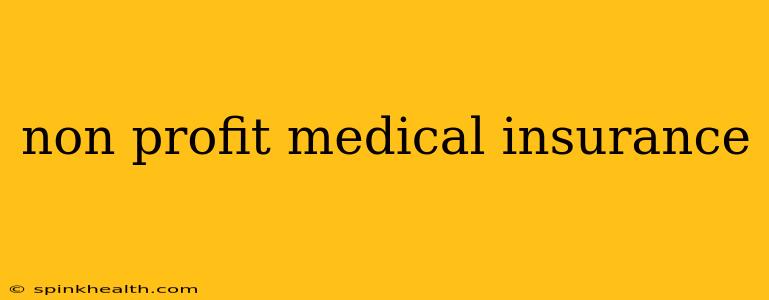Finding affordable and reliable healthcare is a universal concern, and for many, the cost of medical insurance can feel insurmountable. This is where nonprofit medical insurance options step in, offering a lifeline for individuals and families facing financial hardship. But understanding the nuances of these plans can feel overwhelming. This guide aims to demystify nonprofit medical insurance, providing you with the knowledge you need to make informed decisions about your healthcare.
Our journey begins with a story. Imagine Sarah, a single mother working two part-time jobs to make ends meet. The thought of a sudden illness or injury sending her into crippling debt terrified her. Then, she discovered a nonprofit health insurance program in her community, a beacon of hope offering affordable coverage. Sarah's story, while fictional, represents the reality for millions who rely on these crucial programs. Let's delve into the details and explore what makes nonprofit medical insurance different.
What is Nonprofit Medical Insurance?
Nonprofit medical insurance, unlike for-profit insurance companies, doesn't prioritize shareholder profits. Instead, these organizations reinvest their resources directly into providing affordable and accessible healthcare services. They often focus on specific populations or geographical areas with limited access to traditional insurance. This commitment to community welfare is at the heart of their mission.
How Does Nonprofit Medical Insurance Work?
These plans function similarly to traditional insurance, offering coverage for various medical expenses such as doctor visits, hospital stays, and prescription drugs. However, the cost structure and eligibility requirements often differ. Nonprofit insurers may rely on government grants, charitable donations, and membership fees to maintain their operations and offer subsidized premiums.
What are the Types of Nonprofit Medical Insurance?
There isn't one singular type. The landscape is varied. You'll find:
- Community Health Centers: These federally funded centers offer comprehensive healthcare services, including medical, dental, and behavioral health, often on a sliding scale based on income.
- Faith-Based Organizations: Many religious organizations run healthcare initiatives, providing insurance or direct financial assistance for medical expenses.
- Charity Hospitals: These hospitals often provide care to uninsured or underinsured individuals at a reduced cost or free of charge.
Understanding the specific offerings of each type in your area is crucial.
Is Nonprofit Medical Insurance Right for Me?
This depends entirely on your individual circumstances. Factors to consider include:
- Income: Many nonprofit plans have income eligibility requirements.
- Location: The availability of nonprofit plans varies significantly by region.
- Specific Needs: Evaluate the level of coverage offered – does it adequately meet your healthcare requirements?
What are the Benefits of Nonprofit Medical Insurance?
The advantages are compelling:
- Affordability: Premiums and co-pays are usually lower than for-profit options.
- Accessibility: These plans often target underserved populations, ensuring healthcare access for those who need it most.
- Holistic Care: Some plans offer a broader range of services, including preventative care and mental health support.
What are the Disadvantages of Nonprofit Medical Insurance?
It's important to be aware of the potential drawbacks:
- Limited Networks: The network of doctors and hospitals may be smaller than with larger for-profit insurers.
- Waiting Lists: Demand can exceed capacity, leading to waiting lists for certain services.
- Varying Coverage: Coverage levels can differ significantly among different nonprofit plans.
How Can I Find Nonprofit Medical Insurance?
This is where research is key. Start by:
- Contacting your local health department: They can provide information on available programs in your area.
- Searching online for "nonprofit health insurance [your city/state]": This will help you find relevant organizations.
- Checking with faith-based organizations: Many churches and religious communities offer healthcare assistance.
What are the Eligibility Requirements for Nonprofit Medical Insurance?
Eligibility requirements vary greatly. Income level, residency, age, and citizenship status are frequent factors considered. It's imperative to check the specific requirements of each program you're considering.
How Do I Apply for Nonprofit Medical Insurance?
The application process also varies by organization. Some might involve an online application, while others might require an in-person interview. Detailed instructions should be available on each provider's website.
In Sarah's case, finding the right nonprofit medical insurance plan provided her with peace of mind, allowing her to focus on her family and work without the constant fear of overwhelming medical bills. Your journey towards finding affordable and reliable healthcare might start with understanding the options available through nonprofit medical insurance. Remember to conduct thorough research and contact the relevant organizations to determine the best plan for your specific needs and circumstances.

